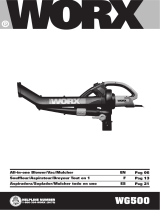
12 AMP All-in-One blower/vac/mulcher EN
54
WARNING: Some dust created by
power sanding, sawing, grinding,
drilling and other construction activities
contains chemicals known to the state of
California to cause cancer, birth defects or
other reproductive harm. Some examples of
these chemicals are:
and other masonry products and
treated lumber.
Your risk from these exposures varies,
depending on how often you do this type
of work. To reduce your exposure to these
chemicals: work in a well ventilated area,
and work with approved safety equipment,
such as those dust masks that are specially
designed to filter out microscopic particles.
WARNING: This product maybe
contains lead, phthalate or other
chemicals known to the State of California to
cause cancer, birth defects and other
reproductive harm. Please wash your hands
after use.
IMPORTANT SAFETY
INSTRUCTIONS
WARNING: When using electric
gardening appliances, basic safety
precautions should always be followed to
reduce the risk of fire, electric shock, and
personal injury, including the following:
WARNING: READ ALL
INSTRUCTIONS
FOR ALL APPLIANCES
1) Avoid Dangerous Environment - Don’t
use appliances in damp or wet locations.
2) Don’t Use In Rain.
3) Keep Children Away - All visitors
should be kept at a distance from work
area.
4) Dress Properly - Do not wear loose
clothing or jewelry. They can be caught in
moving parts. Use of rubber gloves and
substantial footwear is recommended
when working outdoors. Wear protective
hair covering to contain long hair.
5) Use Safety Glasses - Always use face
or dust mask if operation is dusty.
6) Use Right Appliance - Do not use
appliance for any job except that for
which it is intended.
7) Ground Fault Circuit Interrupter
(GFCI) protection should be provided
on the circuit(s) or outlet(s) to be
used for the gardening appliance.
Receptacles are available having built-in
GFCI protection and may be used for this
measure of safety.
8) WARNING -To reduce the risk of
electric shock, use only with an
extension cord intended for outdoor use,
such as an extension cord of cord type
SW-A, SOW-A, STW-A, STOW-A, SJW-A,
SJOW-A, SJTW-A. or SJTOW-A.
9) Extension Cord - Make sure your
extension cord is in good condition.
When using an extension cord, be
sure to use one heavy enough to carry
the current your product will draw. An
undersized extension cord will cause a
drop in line voltage resulting in loss of
power and overheating. Table 1 shows
the correct size to use depending on cord
length and nameplate ampere rating. If
in doubt, use the next heavier gage. The
smaller the gage number, the heavier the
cord. To reduce the risk of disconnection
of appliance cord from the extension cord
during operating:
ii) Use one of the plug-receptacle retaining
straps or connectors described in this
manual.
10)Avoid Unintentional Starting - Don’t
carry plugged-in appliance with finger
on switch. Be sure switch is off when
plugging in.
11)Don’t Abuse Cord - Never carry
appliance by cord or yank it to disconnect
from receptacle. Keep cord from heat, oil,
and sharp edges.
12)Don’t Force Appliance - It will do the
job better and with less likelihood of a











